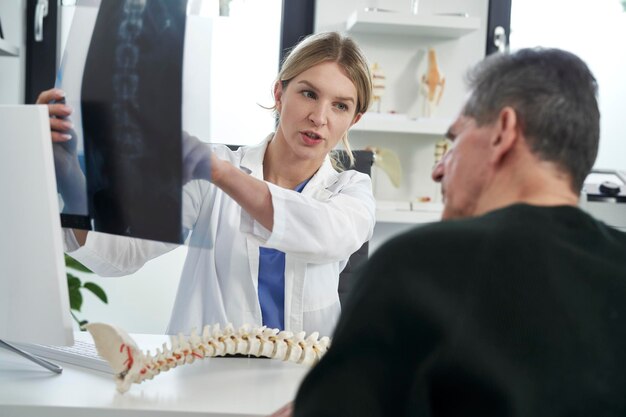Degenerative disc disease (DDD) can cause back pain and may result in disability. As intervertebral discs dry out and shrink with age or injury, nerves are compressed, resulting in inflammation, muscle spasms, sciatica, or neuropathy. Non-surgical spine care offers innovative ways to manage symptoms and stop progression. Implementing a multifaceted treatment plan provides lasting relief without resorting to risky surgery. A back doctor can explore these non-surgical treatments for DDD:
Lifestyle Changes
Lifestyle adjustments can help alleviate DDD back pain. Losing excess weight reduces load and stress on the spine’s discs. A back doctor may recommend avoiding activities, such as heavy lifting, bending, or twisting, that aggravate symptoms. Applying ice therapy might help ease muscular tension and inflammation associated with disc degeneration. Proper posture and ergonomics may also help manage symptoms.
Physical Therapy
Physical therapy aims to improve mobility, strengthen muscles supporting the spine, and teach body mechanics. Specific exercises are designed to relieve pressure on affected discs and increase the spinal column’s range of motion. Patients may learn techniques to brace muscles when performing everyday activities to minimize wear and tear. Regular at-home PT provides lasting tools for managing DDD.
Osteopathic Manipulation
Osteopaths specialize in treating musculoskeletal pain through hands-on spinal manipulation and massage-like tissue release techniques. Gentle stretching and mobilization of the soft tissues surrounding damaged discs could reduce inflammation or pressure on nerve roots. Manipulation may also encourage fluid exchange to nourish spinal discs.
Chiropractic Adjustments
Chiropractors use spinal adjustments and manipulations to improve mobility and reduce nerve compression. By realigning the vertebral joints, they minimize the pressure on damaged discs that contribute to inflammation and nerve pain. This noninvasive treatment restores motion and brings nutrient-rich blood flow to disc tissue. DDD patients can pursue long-term chiropractic treatment to keep symptoms at bay.
Medications
For acute flare-ups of DDD pain and sciatica, non-opioid anti-inflammatory medications or muscle relaxants can help. These oral medications may help relieve painful muscle spasms and inflammation related to disc issues. For chronic neuropathy, a back doctor can prescribe medications like gabapentin to dull nerve pain signals. Medications might make engaging in therapeutic exercises and PT more comfortable.
Spinal Decompression
Spinal decompression therapy is an effective non-surgical option for DDD. Patients are fitted with a specialized brace connected to a computer-controlled table. The table then pulls and releases the spine to relieve disc pressure and create a vacuum effect within the discs. This enhances fluid exchange and nutrient delivery to heal damaged tissues. Many patients report decreased pain and improved mobility with spinal decompression treatments.
Healthy Diet
An anti-inflammatory diet high in omega-3s found in fish, nuts, and oils might help manage DDD. Antioxidant and nutrient-dense fruits and vegetables aid in healing damaged tissues. Staying hydrated and limiting dehydrating beverages like coffee and alcohol keeps spinal discs supple, as water provides regenerative qualities. A probiotic gut microbiome reduces systemic inflammation. Diet also helps optimize non-surgical treatment results.
Visit a Back Doctor Today
While DDD may not be reversed, therapies offer options for managing back pain. An array of non-surgical treatment options help minimize pain and improve mobility. Implementing positive lifestyle adaptations and giving damaged tissue tools to heal empowers patients to live active lives despite spinal disc degeneration. Take control of your health by scheduling a consultation with a back doctor today.
